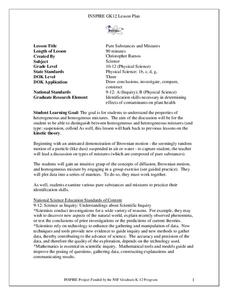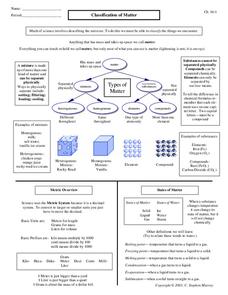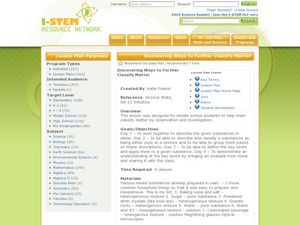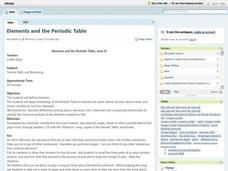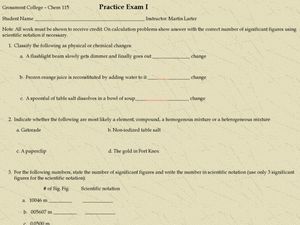Heterogeneous Mixture Teacher Resources
Find Heterogeneous Mixture lesson plans and worksheets
Showing 84 resources
Curated OER
Solutions, Suspensions, & Colloids Lab
In this solutions, suspension and colloid worksheet, students complete a lab experiment in order to determine if a given mixture is a solution, suspension or colloid. They are given six vials and they record their observations of each...
Normal Community High School
Classification of Matter
Steel is an example of homogeneous mixture, also called an alloy, which is made of iron and carbon. The presentation introduces learners to elements, compounds, and mixtures. They explore their similarities and differences, and then take...
Curated OER
Classification of Matter
In this classification of matter worksheet, students answer 15 questions about solids, liquids and gases, types of mixtures and compounds vs. elements. They also answer 2 questions about measurement and 1 question about a biome.
Curated OER
Mixing in the Kitchen
Students identify the different types of mixtures. They identify examples of solutions, suspensions, colloidal dispersions, and emulsions through a game and basic experiments.
Curated OER
Pure Substances and Mixtures
Young scholars compare and contrast the properties of substances and mixtures. In this chemistry lesson, students simulate spontaneous mixing by performing a short class activity. They differentiate heterogeneous and homogeneous...
Curated OER
Matter and Change
In this matter and change learning exercise, students answer 24 questions on topics such as elements, compounds, mixtures and chemical reactions. Students answer questions about the properties of matter such as their physical state and...
Curated OER
Classification of Matter
In this classification of matter learning exercise, students answer 5 questions about the composition of matter, solutions, colloids and suspensions, and the properties and changes of matter.
Curated OER
Classification of Matter
For this matter worksheet, learners compare the different types of matter, including the states of matter. Students review the metric system. This worksheet has 12 matching, 18 fill in the blank, and 4 short answer questions.
Curated OER
Solutions, Suspensions, and Colloids
For this solutions, suspension, and colloids worksheet, young scholars answer questions as it relates to their reading information about solutions, suspensions, and colloids. Students observe different examples and complete a chart as...
Curated OER
Discover Ways to Further Classify Matter
Students analyze and classify substances. In this classifying matter lesson, students look at various substances and identify them as heterogeneous or homogeneous mixtures, pure substances, or solutions. Students bring...
Curated OER
Equilibrium Equations
In this chemical reactions activity, students calculate the equilibrium constant for given reactions. Students decide if reactions are homogeneous or heterogeneous and if the equilibrium favors reactants or products. This activity has 4...
Curated OER
Water Unit
For this water worksheet, students review the properties of water including the density, boiling point, and evaporation. Students define mixture, solute, and solvent. This worksheet has 22 short answer questions.
Mr. E. Science
An Introduction to Matter
What's the matter? Gas, solid, liquid, or plasma. The presentation covers how to describe and identify matter, changes in matter, types of matter, measuring matter, particles of matter, Democritus, and John Dalton's Atomic Theory.
Curated OER
Overview of Cooperative Learning
Students identify the components of cooperative learning and plan a lesson using what they have learned.
Curated OER
Alloys
Tidy slides and lecture notes for each are included in this presentation on alloys. Instruction begins with the molecular arrangement of a pure element, gold, and progresses to a few example alloys: brass, steel, and nitinol. This...
Curated OER
Atomic Theory
An extremely thorough presentation walks new chemists through the basics of matter. There really isn't a unifying theme, however So many topics are covered: forces, elements, atomic structure, chemical properties, compounds, quarks,...
National Park Service
Reduce Our Carbon Footprint, Let’s Compost!
Roll up your sleeves and get a little dirty with this elementary and middle school compost lesson. All you need is a large plastic container, a couple old newspapers, some organic waste, and a few hundred worms and you're ready...
Curated OER
Properties of Materials - Part B
Students describe the history of materials. They use the kinetic (particle) theory to explain changes of state in matter and trace the flow of heat during changes of state and chemical changes.
Curated OER
Concrete Research
Students explore concrete. In this physical science and computer research lesson, students work in groups to answer specific questions about concrete. Each group of students completes a different worksheet with a specific subtopic....
Curated OER
Worm Compost & Vermicomposting
Students explore vermicomposting, the species of worms needed and the proper climate for it. In this composting instructional activity students make their own worm compost bin.
National Institute of Open Schooling
Chemical Equilibrium
Le Chatelier's interest in thermodynamics and building materials such as cement and plaster led to the Le Chatelier Principle in 1884. Activity 13 in a series of 36 extensively explores chemical equilibrium. Learners read about...
Curated OER
Nuclear Reactions
In this nuclear reaction worksheet, students determine the missing particle from the reaction and then name that particle. This worksheet has 18 problems to solve.
Curated OER
Elements and the Periodic Table
Pupils are introduced to the elements on the Periodic Table and what is meant by element. Using the Table, they identify the name, atomic mass, number and symbol of each element. To end the lesson, they discover the characteristics of...
Curated OER
Chemistry Basics Practice Exam
In this chemistry practice activity, students solve sixteen problems including identifying chemical and physical changes, calculating numbers with significant figures, naming compounds and writing formulas and converting from one unit to...






